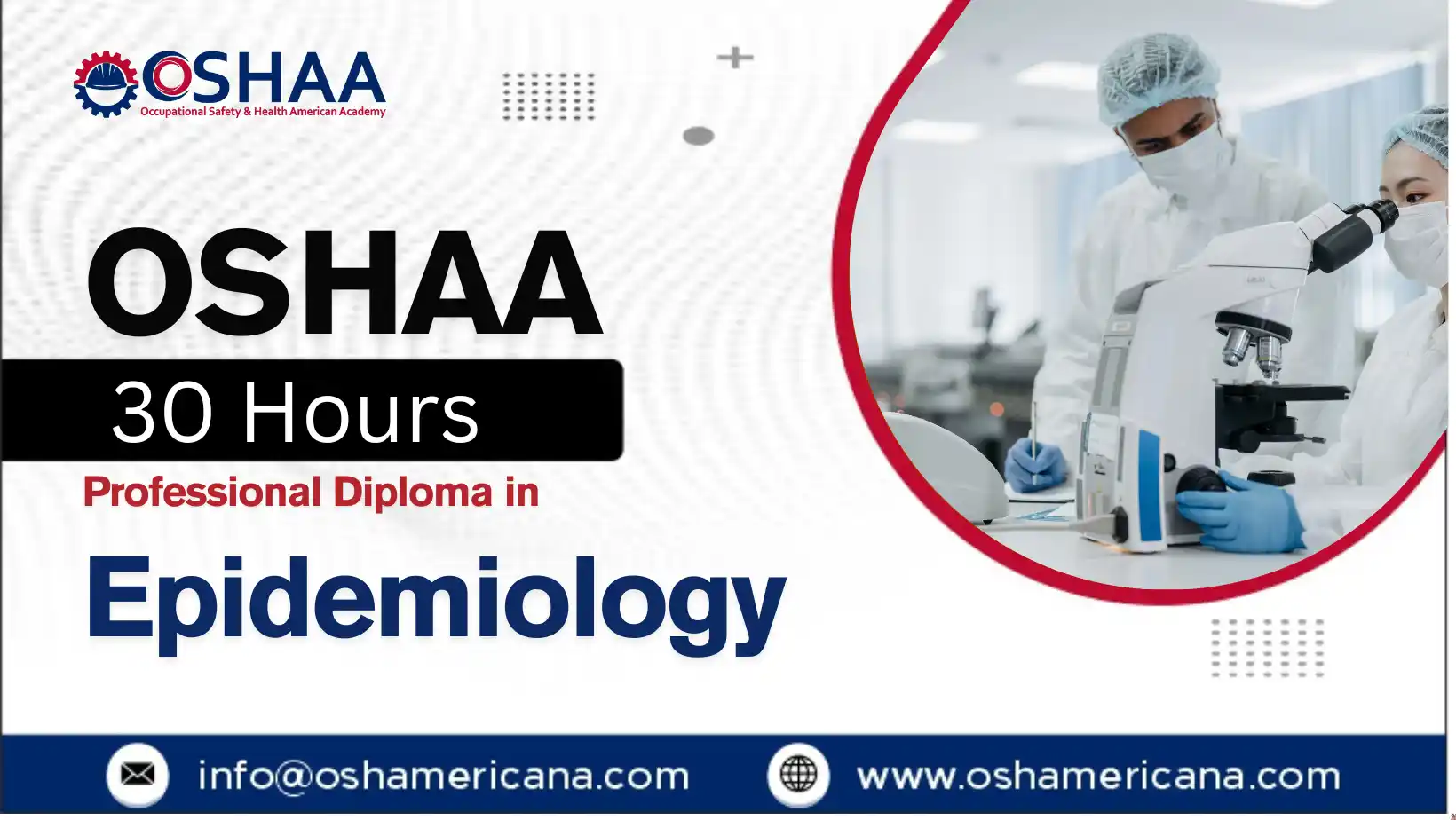Advance Your Career with Professional Diploma in Epidemiology
Understanding how diseases spread, how they can be controlled, and how to interpret health data is vital in today’s global environment. The OSHAA 30-Hours Professional Diploma in Epidemiology equips participants with a strong foundation in epidemiological principles and research methods, providing essential skills for careers in healthcare, public health, research, and policy development.
This diploma introduces core epidemiology concepts and their practical applications. Participants learn disease surveillance, data interpretation, and statistical analysis, enabling them to assess population health trends and design evidence-based interventions. The course addresses both communicable and non-communicable diseases, highlighting epidemiology’s key role in health promotion, outbreak management, and policy planning.
Structured for both theory and practical application, the programme covers the history and foundations of epidemiology, disease patterns, research design, data collection, and analysis. Real-world case studies allow participants to apply their knowledge to global health issues, including outbreaks, environmental hazards, and chronic disease monitoring.
The OSHAA 30-Hours Professional Diploma in Epidemiology provides structured, accessible learning that empowers participants to make informed decisions in public health. It also supports career development in health agencies, research organisations, NGOs, and academic institutions.
OSHAA 30-Hours Professional Diploma in Epidemiology
Study Units
Learning Outcomes
Introduction to Epidemiology and Public Health Foundations (3 Hours)
- Define epidemiology and explain its role in public health.
- Understand the historical development and core functions of epidemiology.
- Recognise the connection between epidemiological methods and health policy.
- Identify key terms, concepts, and the scope of epidemiological research.
Measures of Disease Frequency and Epidemiological Calculations (3 Hours)
- Calculate and interpret incidence, prevalence, and mortality rates.
- Understand risk ratios, rate ratios, and other key epidemiological metrics.
- Apply appropriate measures to assess disease burden within populations.
- Distinguish between absolute and relative measures of disease occurrence.
Descriptive and Analytical Study Designs (4 Hours)
- Differentiate between descriptive and analytical studies in epidemiology.
- Identify the strengths and limitations of cross-sectional, cohort, and case-control studies.
- Understand when and how to apply each study design to real-world research.
- Develop basic skills in formulating epidemiological hypotheses.
Data Collection Methods and Health Surveillance Systems (6 Hours)
- Identify primary and secondary sources of health data.
- Understand the principles of effective data collection and management.
- Explore national and international health surveillance systems.
- Recognise the role of surveillance in detecting disease trends and guiding interventions.
Screening Programmes and Diagnostic Test Evaluation (4 Hours)
- Understand the purpose and principles of health screening programmes.
- Evaluate the effectiveness of diagnostic tests using sensitivity, specificity, and predictive values.
- Recognise ethical considerations in population screening.
- Apply screening data to assess programme outcomes.
Outbreak Investigation and Control Strategies (4 Hours)
- Describe the key steps in investigating a disease outbreak.
- Analyse transmission patterns and identify sources of infection.
- Apply control measures to limit disease spread in various settings.
- Use epidemiological evidence to inform public health response strategies.
Bias, Confounding, and Validity in Epidemiological Research (3 Hours)
- Identify different types of bias and their effects on study results.
- Understand confounding variables and how to control for them in study design.
- Evaluate the internal and external validity of epidemiological studies.
- Improve critical thinking in interpreting research outcomes.
Communicable and Non-Communicable Disease Epidemiology (3 Hours)
- Compare the epidemiological approaches to infectious and chronic diseases.
- Understand transmission dynamics of communicable diseases.
- Analyse trends and risk factors in non-communicable disease prevalence.
- Apply epidemiological tools to plan prevention and control strategies for both disease types.
Course Benefits – OSHAA 30-Hours Professional Diploma in Epidemiology
- Develop a strong foundation in the principles and practices of modern epidemiology
- Learn how to collect, interpret, and analyse health data for informed decision-making
- Gain the ability to assess disease patterns and identify risk factors within populations
- Strengthen critical thinking and research skills applicable to public health and policy development
- Understand how to design, evaluate, and interpret epidemiological studies
- Acquire practical knowledge for investigating disease outbreaks and public health emergencies
- Enhance the ability to evaluate screening programmes and diagnostic tests effectively
- Improve communication of epidemiological findings to professional and public audiences
- Prepare for roles in health services, research institutions, NGOs, and governmental health agencies
- Obtain a recognised diploma that supports professional growth in public health, research, and health education sectors
The OSHAA 30-Hours Professional Diploma in Epidemiology is designed for participants seeking to enhance their knowledge and skills in understanding disease patterns and public health research. This course is suitable for:
- Participants working in healthcare, public health, or health education roles
- Individuals involved in clinical or community-based health research
- Participants aiming to pursue careers in epidemiology, biostatistics, or health policy
- Health professionals looking to strengthen their data interpretation and disease surveillance capabilities
- Individuals interested in contributing to disease prevention and health improvement at a population level
- Participants preparing for advanced study in public health, global health, or medical research
This diploma provides a practical and academically sound foundation for those dedicated to improving population health through evidence-based approaches.







